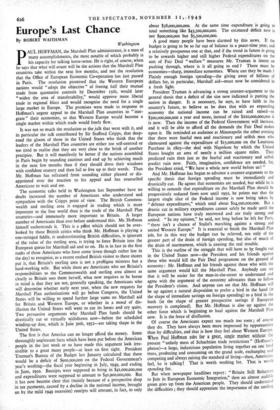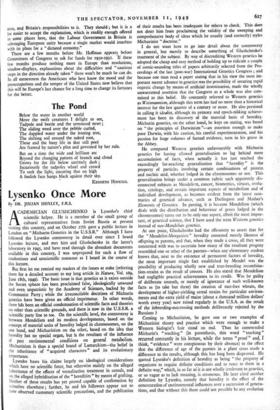Europe's Last Chance
By ROBERT WAITHMAN Washington
pAUL HOFFMAN, the Marshall Plan administrator, is a man o many accomplishments, the most notable of which probably is his capacity for talking horse-sense. He is right, of course, when he says that what will count will be the actions that the Marshall Plan countries take within the next few months, and not the resolution that the Office of European Economic Co-operation has just passed in Paris. The resolution promised that the Western European nations would " adopt the objective " of freeing half their mutual trade from quantative controls by December i5th, would later " widen the area of transferability," would approve more liberal trade in regional blocs and would recognise the need for a single large market in Europe. The promises were made in response to Hoffman's urgent appeal to the Marshall Plan countries to " inte- grate " their economies, so that Western Europe would become a single market within which trade would freely flow.
It was not so much the resolution as the Stalk that went with it, and in particular the talk contributed by Sir Stafford Cripps, that deep- ened the gloom of those in the United States who think that the leaders of the Marshall Plan countries are either too self-centred or too tired to realise that they are very close to the brink of another precipice. But it will manifestly be better if the nations assembled in Paris begin by sounding cautious and end up by achieving much in the next few months than if they should dress their windows with confident oratory and then fail to live up to their words. Thus Mr. Hoffman has refrained from sounding either pleased or dis- appointed over the reaction to his appeal and has counselled Americans to wait and see.
The economic talks held in Washington last September have no doubt increased the number of Americans who understand and sympathise with the Cripps point of view. The British Common- wealth and sterling area is engaged in trading which is more important to the free world than is the trade of the Marshall Plan countries—and immensely more important to Britain. A larger number of Americans than ever before understand this. Mr. Hoffman himself understands it. This is a ptiint which should not be over- looked by those British critics who think Mr. Hoffman is playing a one-stringed fiddle, is underestimating British difficulties, is ignorant of the value of the sterling area, is trying to force Britain into the European queue for Marshall aid and so on. He is in fact in the first ranks of those Americans who have come (even though rather late in the day) to recognise, as a recent exalted British visitor to these shores put it, that Britain's sterling area is not a profligate mistress but a hard-working wife. But while there are Americans who see Britain's responsibilities to the Commonwealth and sterling area almost as clearly as Britain sees them herself, what now requires to be borne in mind is that they are not, generally speaking, the Americans who will determine whether early next year, when the new requests for Marshall Plan authorisations will go before Congress, the United States will be willing to spend further large sums on Marshall aid for Britain and Western Europe, or whether in a mood of dis- illusion the United States will want to cut its losses and cry quits. Two persuasive arguments why Marshall Plan funds should be drastically cut or virtually withdrawn now—before the scheduled winding-up date, which is June 30th, 1952—are taking shape in the United States.
The first is that America can no longer afford the money. Some thoroughly unpleasant facts which have been put before the American people in the last week or so have made this argument look irre- sistible to a great many people—at least on first sight. President Truman's Bureau of the Budget last January calculated that there would be a deficit of $900,000,000 on the Federal Government's year's working—the fiscal year beginning in July, 1949, and ending in June, 195o. Receipts were supposed to bring in $41,000,000,000 and expenditures were supposed to amount to $41,900,000,000. But it has now become clear that (mainly because of a prospective drop in tax payments, caused by a decline in the national income, brought on by the mild 1949 recession) receipts will amount, in fact, to only about $38,000,000,000. At the same time expenditure is going to total something like $43,500,000,000. The estimated deficit now is not $900,000,000 but $5,5oo,000,000• A good many people have been alarmed by this news. If the budget is going to be so far out of balance in a peace-time year, and a relatively prosperous one at that, and if the trend in future is going to be towards higher and still higher Federal expenditures on the sort of Fair Deal " welfare " measures Mr. Truman is intent on pushing through, where is it all going to end ? There must be economies—sharp, immediate economies. Where can they be made ? Plainly enough foreign spending—the giving away of billions of dollars for, in particular, Marshall aid—must now be considered in a fresh light.
President Truman is advancing a strong counter-argument to the general thesis that a deficit of the size now indicated is putting the nation in danger. It is necessary, he says, to have faith in the country's future, to believe as he does that with an expanding economy the national income can be raised and raised—to $30o,000,000,000 a year and more, instead of the $22o,0o0,000,o0o it is now. Then the income of the Federal Government will increase, and it will be able to afford all the demands the Fair Deal makes upon it. He reminded an audience at Minneapolis the other evening that there were fearful men and reactionary and selfish men who clamoured against the expenditure of $15,000,000 on the Louisiana Purchase in 1803—the deal with Napoleon by which the United States bought an area of nearly a million square miles. They predicted ruin then just as the fearful and reactionary and selfish predict ruin now. Faith, imagination, confidence are needed, for, the President cried, " We have a whole new world before us! "
And Mr. Hoffman has begun to advance a counter-argument to the specific thesis that foreign spending must be immediately and drastically cut. He agrees that economies are needed, but while he is willing to concede that expenditure on the Marshall Plan should be progressively reduced from now until 1952, he points out that the largest single slice of the Federal income is now being taken by " defence expenditures," which total about $14,500,000,000. But a drastic cut in military expenditures cannot safely be made until the European nations have truly recovered and are truly strong and united. " In my opinion," he said, not long before he left for Paris, " there isn't a chance of Stalin's marching against a strong and united Western Europe." It is essential to finish the Marshall Plan job, for in this way the budget Can be relieved, not only of the greater part of the drain of foreign spending, but also of much of the drain of rearmament, which is.causing the real trouble.
This is the outline of the struggle that will have to be fought out in the United States now—the President and his friends against those who would kill the Fair Deal programme on the ground of economy : Mr. Hoffman and his friends against those who with the same argument would kill the Marshall Plan. Anybody can see that it will be easier for the man-in-the-street to understand and agree with the argument of the economy advocates than to follow the President's vision. And anyone can see that Mr. Hoffman will be up against a natural disposition to prefer a bird in the hand (in the shape of immediate savings on foreign spending) to a bird in the bush (in the shape of greater prospective savings if European recovery is completed). But Mr. Hoffman is also up against the other force which is beginning to haul against the Marshall Plan now. It is the force of disillusion.
Of course the Americans expect too much too soon ; of course they do. They have always been more impressed by opportunities than by difficulties, and that is how they feel about Western Europe. When Paul Hoffman asks for a great, single market without the present " unholy mess of Schachtian trade restrictions " (Hoffman's phrase)—a large, industrious population living together on one land mass, producing and consuming on the grand scale, exchanging and competing and always raising the standard of living—then, Americans feel, he is talking! That is worth working for. That is worth spending for. But when newspaper headlines report : " Britain Still Reluctant to Join in European Economic Integration," then an almost audible groan goes up from the American people. They should understand the difficulties ; they should appreciate the importance of the sterling
area, and Britain's responsibilities to it. They should ; but it is a lot easier to accept the explanation, which is readily enough offered in some places here, that the Labour Government in Britain is sabotaging European unity because a single market would interfere with its plans for a " dictated economy."
There are a few months before Mr. Hoffman appears before Committees of Congress to ask for funds for 1950-1951. If these few months produce nothing more in Europe than resolutions, window-displays, explanations about the difficulties and " cautious steps in the direction already taken" there won't be much he can do. In all earnestness the Americans who best know the mood and the preoccupations and the temper of the United States now believe that this will be Europe's last chance for a long time to change its fortunes for the better.



































 Previous page
Previous page